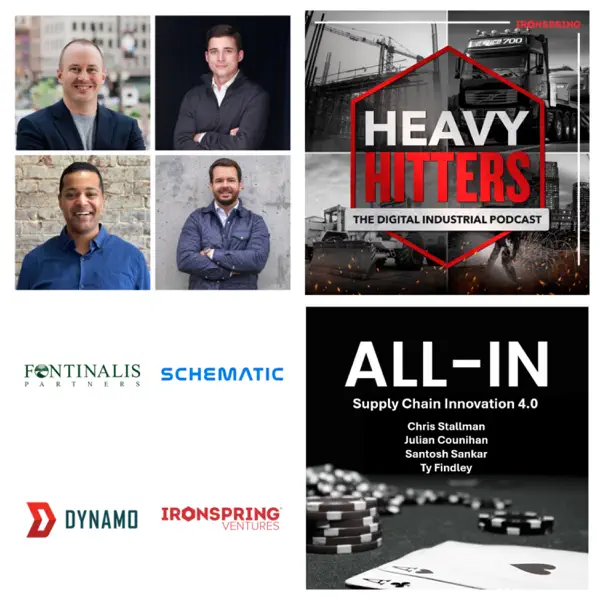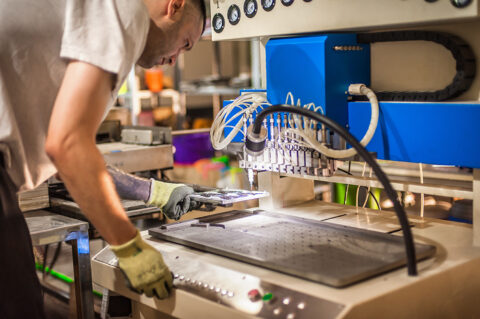The “All-In Supply Chain” podcast is back for another round of hard-hitting insights from four of the sharpest minds in industrial tech investing. Fresh off a whirlwind event season that included CES, Manifest, TPM, BGSA, and ProMat, Santosh Sankar of Dynamo Ventures, Chris Stallman of Fontinalis Partners, Julian Counihan of Schematic Ventures, and host Ty Finley of Ironspring Ventures sat down to compare notes on the state of the sector.
First up: how to maximize value from the seemingly endless parade of industry conferences. While tactics varied, the crew agreed that planning ahead is paramount. Julian summed it up succinctly: “If you show up to the conference, you’re going to have a bad experience. Look at the speaker lists, reach out to the speakers. If there’s an app, download the app as soon as it’s available.”
But in a year marked by geopolitical reshuffling, vacillating tariffs, and supply chain whiplash, the main event was a dissection of the macro landscape’s impact on industrial tech. The consensus? Cautious optimism, tempered by a healthy dose of uncertainty.
“Inside of our portfolio companies for the last couple of years, the mandates have been manage costs, focus on volume, don’t take jobs that will hemorrhage margin,” Sankar explained. “But position yourself where, when the market does start to improve, namely pricing, one could be a beneficiary, because your cost base has already been reconciled much lower than during the COVID days.”
Stallman echoed the sentiment, noting that some of Fontinalis’ portfolio companies are seeing direct impacts from DOGE spending cuts, while others are riding the tailwinds of re-industrialization. The key, he argued, is constant communication with customers to stay attuned to their shifting priorities.
Of course, no supply chain tech conversation in 2025 would be complete without addressing the AI elephant in the room. The crew coined a new term – “annual curiosity revenue budget” – to describe the flood of interest from customers eager to experiment with the latest and greatest in artificial intelligence.
“It is mostly curiosity budget, and I’ve spoken to some carriers who are piloting and big customers of the big AI workflow products for trucking,” Counihan noted. “And they themselves have expressed, we’re just trying out. We’re playing around. We’re seeing if it fits. They are not saying this is critical.”
The takeaway? AI may open doors and accelerate sales cycles, but the onus is on vendors to prove their value proposition ASAP, lest they be relegated to the realm of shiny objects.
The episode wrapped with a revisiting of the crew’s 2020 treatise on the merits of VC specialization. Five years on, the case for domain expertise has only strengthened.
I’m on boards with Ty. I’m on boards with Santosh, and the introductions of the people that we know are relationships we’ve built over many trips to random conferences in the middle of nowhere, where we’ve been invited by one colleague contact who’s invited another folks. And it’s that relationship building, which is still incredibly critical in the supply chain category, where they care so much about who you know, your credibility in the category, references, networks, et cetera.
As for what’s next in supply chain tech? Finley sees untapped potential in the connections between sub-sectors like manufacturing, logistics, and construction. “I would just encourage founders, we’re seeing this specialization of supply chain even take the next leap forward of connecting industries,” he urged.
One thing’s for certain: with this crew keeping a watchful eye on the horizon, the future of industrial innovation is in good hands. Stay tuned for more clear-eyed takes on the technologies, trends, and visionaries shaping the world of supply chain – because when it comes to this sector, Sankar, Stallman, Counihan, and Finley are truly all in.




